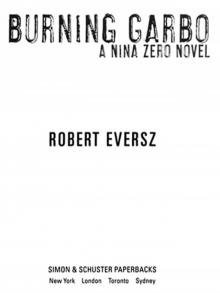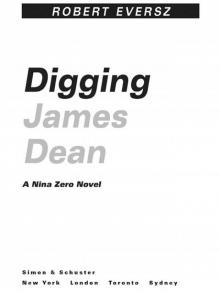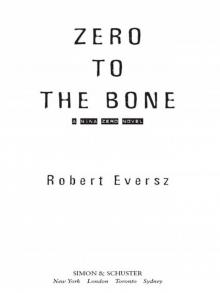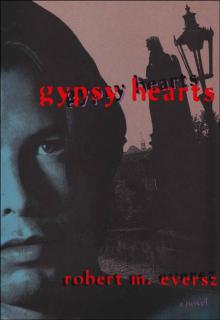- Home
- Robert Eversz
Zero to the Bone Page 14
Zero to the Bone Read online
Page 14
I drove into the desolate grid of remote parking and air-freight warehouses east of the airport, following the car rental signs until I spotted the Budget pole-sign floating over a flat-roofed building. Frank wrote something on a sheet of paper and stuffed it into an envelope while I parked in one of the few spaces reserved for the drive-in trade—almost all of their customers took the shuttle from LAX.
I told the Rott to stay in the car and followed Frank inside a one-room customer service area with flanking counters and a switchback rope line near the entrance. We arrived between shuttles, the rope line empty and only one of four sales representatives busy with a customer. Frank skirted the ropes, scanned the faces of the waiting reps, and walked up to a mid-thirties Latino with swept-back hair and a broad face whose brass name tag read “Frank.”
“Hi, Frank, what a coincidence, my name’s Frank, too.” Frank smiled and bobbed his head as though genuinely delighted. “I think coincidences like this bring luck. What do you think?”
The man’s brow wrinkled toward his eyes and he smiled, a little confused but wanting to be friendly. “I think we’re in luck, then,” he said. “Do you have a reservation today?”
“No reservations, no, but we’re definitely looking for a car.”
“What kind of car are you looking for?”
“Kind of car?” Frank asked, as though he didn’t understand.
“Compact, midsized, full-sized…” He gave us a dubious look. “Maybe luxury?”
Frank leaned back and looked at me for the answer.
“We want a white Hyundai Sonata,” I said.
The rep nodded as though I’d just made a perfectly reasonable request. “That would be a midsized vehicle.” He shifted to face his computer screen. “Are you looking for a reservation beginning today?”
“We’ve written down our full itinerary right here,” Frank said, sliding the envelope onto the counter.
The sales rep reached for the envelope without taking his eyes from the screen, confirming the current availability of white Hyundai Sonatas, then glanced down to finger out the folded sheet of paper. A clear look of understanding buzzed his eyes when he spotted the fifty-dollar bill, as though the whole thing made sense to him, good sense. He slid the envelope containing the fifty under his keyboard and unfolded the sheet of paper, which listed the license plate number and the date of Christine’s funeral. I’d wanted Frank to accompany me to the agency because he excelled at this type of operation; he’d marked the guy he thought would be most flexible and set him up to expect something a little unusual, so the sight of the money was a pleasant surprise rather than a shock.
“I’m sorry, the car for the dates you’ve requested are completely booked,” the rep said, jotting down information from his reservations screen. “Can I help you with another reservation?”
“I think that’s it for today, thanks.”
“Don’t forget your itinerary,” the rep said, and handed the folded sheet of paper back over the counter.
Frank played a little game with the paper while we walked to the car, pretending to offer it to me then snatching it away when I reached for it. “I did all the work here,” he said. “I should have the right to first look.” He carefully unfolded the sheet of paper, put his nose to it, and then thumped his hand against his chest as though he’d just been hit with a heart attack.
I plucked the note from his hand and read the name, birth date, address, and driver’s license number the rep had written beneath the plates. The kid’s name was Stewart Starbal and he lived in Beverly Hills. I did the math. He was only nineteen years old. “How did he rent the car?” I asked. “I thought you had to be, what, twenty-something to rent a car.”
“Not if your daddy is one of the top power brokers in Hollywood.” Frank recovered from his heart attack and lit a cigarette. “Our friend didn’t give us the credit card info but I’ll bet my last smoke that it’s an American Express Platinum in daddy’s powerful name.”
“You mean the guy who did the space vampire films?” I tried to remember the titles, big-budget action films with more computer-generated imagery than live action. The vampire, a wicked female wired and implanted with biocompatible weaponry, worked as a covert assassin, killing in various imaginative ways a diverse array of intergalactic bad guys, most of whom had drinkable blood.
“Each of those space vampire films grossed more than two hundred million,” Frank said, shaking his head at the casual way I’d summed them up. “We’re up to number five in the series and Jason Starbal not only produced every one of them, he owns the original copyrights.”
I opened the door for the Rott, looked at the name again. “But this says Stewart, not Jason Starbal. What makes you think he’s related?”
“Look at the address.”
The driver’s license listed a number on Trousdale Place.
“North of Sunset,” I said.
“Not just north of Sunset. Trousdale Estates.”
Originally part of the largest private estate in the history of Beverly Hills, owned by the oil-rich Doheny family, Trousdale Estates wasn’t developed for residential use until the 1950s and quickly became the address of choice for Hollywood’s celebrity elite, from Marilyn Monroe to the great Elvis himself. Strict building codes limited the height of residences to a single story, and each estate was so completely walled and lushly landscaped many houses weren’t even visible from the street. Celebrities value privacy and security almost as much as fame and money, and Trousdale Estates offered both, backed by a 24/7 private security patrol. I’d tried to photograph subjects on those streets before and failed. The neighborhood was a paparazza’s nightmare.
I located the Starbal estate easily enough on the map and after dropping Frank at the office parked across from its heavenly-white gates, the Thomas Guide on my lap and my eye on the clock. The gate stood seven feet high, keeping a solid line with the brick security wall, also painted white but embossed with gold stars and partially screened by a row of evenly spaced camellias. To see beyond the wall I’d need to vault it or wait for the gate to open. A stakeout wasn’t an option, not there. I commanded the Rott to stay and jumped the door frame, leaving my camera gear behind. Near the security wall I broke into a running start and leapt, grabbing the top ledge to pull myself high enough to see over the top. The drive cut through a loping green lawn and circled a fountain centered by a famous nude man, painted gold—a larger-than-life-sized replica of the Oscar award, symbolizing either Starbal’s ambitions or unfulfilled career expectations because the Academy had yet to nominate his films for anything. Behind the arcing jets of water sprawled a white neoclassical mansion with glistening marble colonnades. Two vehicles were parked at the garage end of the drive, a new BMW M3 and a more modest PT Cruiser. I released my grip and dropped back to the ground. Something about the wall bothered me and I glanced back as I walked away, noticing I’d left black scuff marks on the immaculate white surface. Oops.
Ten minutes after I’d parked, a private security sedan rolled to the curb in my rearview mirror. The security guard who sauntered toward the Cadillac sported a mustache like a real L.A. cop but not the talk-back-to-me-you-die attitude. His job was to keep order in the neighborhood, not arrest people. When he neared the driver’s door I glanced over my shoulder as though surprised and braced the Thomas Guide against the steering wheel. He glanced from my face to the map and back to my face. I tried to look helpless—hard to do when you have a nose stud and multiple ear piercings above the collar of a leather jacket, not to mention a hundred-pound Rottweiler in the passenger seat—and asked him for directions to a street on the other side of Coldwater Canyon Drive. He was happy to direct me and we parted good friends.
Most of the estates in Beverly Hills lie nestled into the Santa Monica Mountains north of Sunset Boulevard and because the roads are relatively few, residents leaving the enclave must funnel down the canyons to less than a dozen streets crossing Sunset; only a couple streets in Trousdale Estates led to
Sunset, and of these two, Loma Vista cut the more direct route. Parking on the street north of Sunset is punishable by immediate deportation by the Beverly Hills Police Department. I cut across Sunset and spun the Cadillac into a two-hour parking spot facing north, toward the hills, where I raised the canvas top and set up camp. Lensing the face of every driver rolling toward Sunset from Trousdale Estates was going to be tedious, but I didn’t see any other way to do it.
An hour and over two hundred cars into my wait the distinctive grille of a Crown Victoria slid into the spot behind mine, signature police lights folded toward the windshield. I lowered the Nikon into the camera bag, afraid Logan would emerge from behind the wheel and not much comforted to see Sean instead. I zipped the bag with one hand while I watched him approach in the rearview mirror.
“Do you have a minute to talk to me?” he asked.
I half expected him to tell me to put my hands behind my head and step out of the car, a more typical request when I’m approached by a cop from behind, but that was no more than my usual paranoia. I leashed the Rott, figuring this would be as good a time to take him for a walk as any.
“How did you know where I was?” I asked.
“Your colleague told me.” He kneeled to take the Rott’s head in both hands, wearing the same black leather jacket as the night I met him despite a late-afternoon temperature approaching the high 70s. He was as hard core about his leather as I was.
“You could have just called,” I said.
“I wanted to surprise you.” He stood and glanced around the street, the homes large but not palatial, a respectable upper-middle-class neighborhood with views of the obscenely rich on the other side of Sunset. “What are you doing parked here?”
“I heard a rumor Madonna was in the neighborhood.”
We both knew it was a lie, just like we both knew the reason he hadn’t called wasn’t because he wanted to surprise me. When he caught me trying to peer through the dark barrier of his sunglasses he folded them into his breast pocket, revealing a glance as warily curious as a coyote’s. He’d missed his shave that morning, maybe two mornings straight, the stubble matching his jacket and the color of his hair. He looked pretty hot to me, I won’t deny it, but I wasn’t going to burn my lips on that flame, not twice. I gave the Rott the lead and followed him down the street, away from the traffic on Sunset.
Sean walked at my side, matching his stride to the Rott’s stop-go rhythms, and asked, almost formally, “Did I say or do anything that led you to believe Rakaan was the chief suspect in the murder of your friend Christine?”
“Are you trying to play me?” I asked.
His head cocked to the side. “What do you mean?”
“I mean you lied to me last night, so are you lying to me again?”
The Rott stopped to sniff the skirts of an azalea bush as though they held some promise. I looked at Sean, trying to figure him out. He kept his head cocked to the side and he remained silent.
“You convinced me Rakaan was nothing special. I believed you when you said nothing was happening the night of the bust. I packed up and missed the shot.” The Rott lost interest in the azalea and nearly pulled my arm from its socket when he bulled forward.
“I didn’t lie to you about last night,” he said when he caught up. “Sure, I may not have been completely forthcoming about Rakaan but I didn’t know they were going in for the kill. From what I understand, the decision to move came in a hurry, possibly because someone tipped them that he was trying to dispose of evidence.”
“My tip, you mean,” I said.
“Officially recorded as an anonymous tip.” He gripped my elbow to make sure I listened. “An anonymous tip that suddenly wasn’t so anonymous after a certain reporter faxed a photo of Rakaan disposing of evidence.”
Sean wasn’t going to tell me outright what he really meant; he was going to make me work for it. I tried to read his eyes. Something both worried and irritated him. “You phoned Logan to report a tip from an anonymous source,” I started.
He nodded. I was headed in the right direction.
“The next morning he gets a photo that identifies the source as me. He knows you know who I am. You know what I do. If I called you on the phone, you’d recognize my voice.”
“‘How the fuck is she an anonymous source, Tyler?’” Sean said in Logan’s voice. “‘You knew who she was. You lied to me about my own fucking investigation. Maybe it’s a two-way leak. Is it?’”
I winced. I never saw it coming. Neither had Frank. I heeled the Rott and stood over his shoulders, holding him in place with my knees. “He thinks you fingered Rakaan for me?”
Sean nodded.
“I talked to Rakaan before Logan did,” I said.
“I’m not the one who needs to be convinced.”
“Logan is playing a mind game with you,” I said, seeing clearly what was going on. “He didn’t even consider Rakaan a suspect until I convinced one of my friends to talk about Christine’s so-called therapy sessions. He knows people are willing to talk to me and it ticks him off. And Rakaan? A hypnotherapist with a Hollywood A-list clientele? It’s like you couldn’t invent a more tabloid-ready suspect. He’s trying to back you down, that’s all.”
“Back me down or throw me off.”
“We didn’t send the video to him, we gave it to you. He’s jealous already. Then the tip that leads to Rakaan’s arrest comes through you. If he wants to take credit, he has to slap you down.”
“That’s the way I figured it too but that doesn’t make life much easier.”
The Rott squirmed between my knees. I told him to heel and walked him back toward the car, trying to figure why Sean needed to tell me this. Maybe he was telling me not to call him again and being far too subtle about it. “What was in the bag, the one Rakaan threw?” I asked.
Sean puffed out his cheeks, stressed by the question. “I don’t know if I can tell you that.”
“I told you it was there. The least you can do is tell me what was in it.”
“I can’t tell you that, not on the record.”
“Then off the record.”
He stared at me while we walked, and I thought he wasn’t going to answer, but as usual I was misreading him, or maybe just reading him half right. “The bag contained bondage gear.”
That didn’t surprise me.
“His DNA showed on her body, didn’t it?”
“Not just his,” he said, and followed that stunner with silence.
“Rakaan isn’t the only one involved.”
“Hard to say what it means.”
I spotted the high, sloping profile of a PT Cruiser speeding down Loma Vista—the same car I’d seen in Starbal’s drive. I judged the distance to my car as I watched it veer left onto Sunset, headed toward the Strip. I’d need a helicopter to catch him. I turned back to Sean, who watched me with the same anxious interest I’d taken in the PT Cruiser. I forgot about Stewart Starbal for a moment and asked, “Who sent me the video? Not Rakaan.”
“The maid,” he said. “Nobody can find her. She came in once a week to clean. They think she found out what was going on, mailed you the copy because you were connected to Christine.”
“Watch the video. Rakaan wasn’t alone in that room. If you look in the corner of the frame while Christine is being strangled, you’ll see a shadow cross the floor. I don’t think it was the maid.”
“I’m not going to watch the video because it’s not my case to work. I didn’t even keep a copy to look at. It’s not my concern. It’s Logan’s.”
I’d figured Sean had bigger eggs than that, and to hear him worry about case protocol disappointed me. I’d thought he was a little bit of an outlaw, like me.
“If you don’t care one way or another, why did you come here?”
Sean crossed in front of me and stopped, his look sliding to pure worry. “If Logan is willing to slap me down, I figure someone like you he’s willing to take off at the head. So be careful. I know you tabloid types are aggr
essive by nature—”
“I’m not aggressive,” I said. “I’m persistent.”
“You want to call it persistence, fine, the end result is the same. If you irritate Logan so much he thinks you’re a problem, he’s not going to show you any mercy. Trust me, he’s capable of setting you up and cutting you down.”
“I trust you,” I said.
The single line that creased his forehead relaxed and he smiled like a male Mona Lisa. “I came for one other thing,” he said, and when I asked him what, he slid into my arms and kissed me with such a fierce tenderness that I nearly felt too stunned to respond. Nearly. But not quite.
When he walked away I wondered if the kiss was off record, too.
16
WHEN I LEFT the apartment with the Rott that evening to run the wet sand at low tide I felt as though someone watched me from a distance, a feeling I imagine I inspired in others who felt no less uncomfortable about it than I did. While I ran, I wondered who would take the trouble and why. I thought about the rat that had been left on the seat of my car the morning before and whether I should consider checking into a motel for the next few days. I quickly decided against it. The Rott and I had faced down scarier situations than a dead rat. I’d installed new security locks the first week I’d moved in and the front windows were protected by quick-release security bars. I’d be easy to find at Scandal Times if someone wanted to get me badly enough. At the Santa Monica pier I broke the run to do stomach crunches and push-ups in the sand, then pushed myself a little harder than normal on the run back. Too many thoughts skied through my mind. Pain blotted them out.
Less than an hour after we returned to the apartment, the Rott alerted me with a bark that someone climbed the stairs. He hadn’t quite learned the footsteps of everyone in the building—a difficult task considering the transient population—and I figured one of the half dozen illegal immigrants who lived next door had caught his attention, until the doorbell rang. I stuffed down the last bite of a Trader Joe’s microwaved enchilada and walked to the door. The bullet shape of my father’s skull lurked on the other side of the parabolic peephole lens. I opened the door too shocked to say anything except, “What the hell are you doing here?”

 Burning Garbo
Burning Garbo Digging James Dean
Digging James Dean Zero to the Bone
Zero to the Bone Gypsy Hearts
Gypsy Hearts